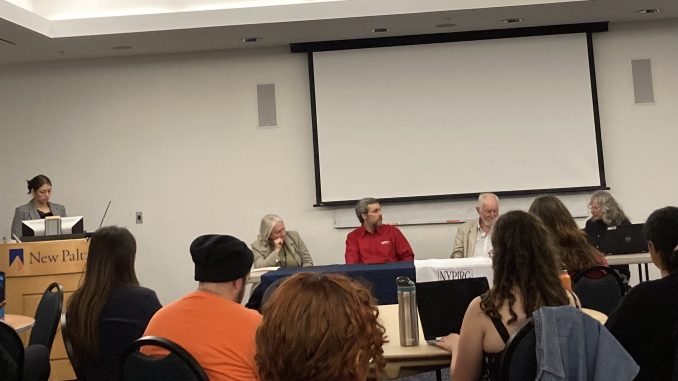
New Paltz’s New York Public Interest Research Group (NYPIRG) hosted a panel on Nov. 2 in the Student Union Building to discuss with college students about why they should care about the future of Social Security. The panel was moderated by third-year political science major Krysta Schrader and featured experts on the government program.
Social Security is a needs-based program that provides a fixed income to retired senior citizens and those unable to work. It plays a crucial aspect in millions of many American lives as the country’s largest anti-poverty program. 70 million Americans receive Social Security, and without it an additional 22.5 million people would be in poverty. Despite its massive and essential impact, it continues to lose money. Social Security will only be able to pay about 75% of scheduled benefits by 2035 because the country is paying out a greater amount in benefits than it receives from taxes as more people make it to retirement age. This means all employees paying money into the program may not receive benefits in the future.
“If everybody in this room has had a job at some point, you’ve already started paying into the program,” Joe Stelling from the American Association of Retired Persons (AARP) told attendees. “You can believe if you’re younger, you’re going to be paying into this program your whole life. The question is whether the benefit that you earn is there for you when you’re at the other end.”
Retired political science professor Emeritus Glenn McNitt asked the college students in the room why they attended the panel. Many discussed how receiving Social Security benefits has impacted their lives as well as witnessing their older caretakers struggle to survive on Social Security.
“I live with my mom and my grandma, and they’ve always had problems with getting Social Security. I always remember going to the Social Security department. I have that personal connection with Social Security and it’s frustrating when you don’t feel like you’re getting a sufficient amount,” shared one student.
Current beneficiaries are struggling to survive on Social Security alone. Retirement in America is often analogized to a three-legged stool. One leg is Social Security and the other two are individual savings and employer-based retirement programs. However, many individuals make it to retirement with only Social Security to rely on. The average Social Security benefits are $1,667 per month. After working their whole lives, it’s still a challenge for people to live on just Social Security. The struggle of not having enough money is an end-of-life reality Americans must face.
“Can you imagine you get $1,600 a month? That’s less than $400 a week and that’s your whole income,” said Stelling. “Older New Yorkers are facing the same financial challenges everybody is right now with the economy where it is, and then all you have is $1,600 a month that pays your rent and puts some groceries on the table.”
Director of Ulster County Office for the Aging Susan Kopenhaver works to bridge the gap that Social Security benefits don’t cover. “They come to us for help. They don’t have enough money for transportation. They don’t have enough money sometimes for food,” she said.
“25% of the American population across the country are on Social Security, and for the majority of those people Social Security is the only income they have. They’re barely surviving, if they’re surviving and have help from others,” said McNitt, who shared that he’s fortunate enough to survive based off his union retirement program and state university pension.
Kopenhaver also warned about gig economy, which are people that provide service for short-term work like performers or ride service drivers, based on seniors she works with in Woodstock. “Woodstock was known for many, many years as a haven for artists and musicians and writers. They lived in the gig economy. They didn’t get paid through a paycheck. They did not submit taxes to Medicare or Social Security their entire lives,” she said. “They’re telling us when they call us that they have no income, no Medicare, no Social Security. They’re not eligible for anything.”
“They did not pay into the system. So, the only way to get something out of the system, as your entitlement, is to pay into it.”
The future of retirement savings besides Social Security appears unfavorable. Over half of private sector employees have no way to save through their employer for retirement or a 401k, and as the cost-of-living rises, individual savings become less realistic to have and maintain.
“Fewer jobs provide retirement benefits. Social Security may be the only guarantee for young workers for their retirement income,” said President-Elect of Senior Action Council Helen Edelstein. “So it has to stay, and the fight has got to be about how do we strengthen Social Security, not how do we reduce benefits.”
The panelists discussed possible legislative solutions, such as changing the annual Cost of Living Adjustment (COLA) and expanding benefits. “If the government itself doesn’t support [Social Security], or find a different way to fund it, it’s going to be very difficult for everybody because it’s going to fall on taxpayers,” said Kopenhaver.
The panelists also shared their hopes that younger generations care about the future of the program, “I hope young people take away that this is a relevant challenge to all our lives,” said Stelling.
“Let’s let young people have a voice in this. My only hope is that it’s a voice that’s learning and reasonable,” added McNitt.
“People should know about Social Security and what’s wrong. You guys have to think through about what ought to be done, and I trust you’ll do the right thing.”

